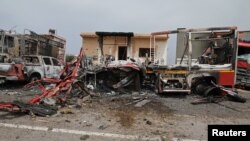Forces loyal to Libya's two rival governments continue to square off in and around the capital, Tripoli, as each side tries to wrest strategic positions and territory from the other.
Amateur video posted by forces loyal to eastern military chief Gen. Khalifa Haftar showed his men appearing to advance, as other video appeared to show rival Tripoli-based forces withdrawing men and vehicles further inside the city. It was not possible to confirm either movement.
Tweets by the Tripoli government of Prime Minister Fayez al-Sarraj maintained that its forces had destroyed rockets and military vehicles belonging to Haftar's side, but VOA could not confirm those claims either.
Paul Sullivan, a professor at the National Defense University in Washington, told VOA that the "dust storm of war" in Libya is being supplemented with "disinformation and downright lies." He said that while both sides are claiming “a win or two," the people of Libya "are losing all the time" and that the "nightmare needs to end."
Media sources close to the Tripoli government say Haftar's side killed civilian members of one family during shelling inside the capital in the past 24 hours. Media loyal to Haftar showed Parliament speaker Aquela Salah meeting with families of those killed by rival Tripoli forces.
Col. Mohammed Qanunu, spokesman for Tripoli-based military forces, say fighter jets loyal to his side had bombed targets inside the strategic Al Wuthia airbase, west of the capital. Turkish-backed Syrian militia fighters have been trying to capture the base from Haftar's men in days of bitter fighting.
Haftar's military spokesman, Col. Ahmed Almasmari, alleged over the weekend that Turkish President Recep Tayyip Erdogan is using Syrian mercenaries to try to capture the airbase as Erdogan and the militias that Turkey supports are losing ground in Tripoli.
Ankara threatened Sunday to attack forces loyal to Haftar if Turkish diplomatic missions or other interests were hit. Turkey claimed that the area around its Tripoli embassy was struck last week. Haftar's side denies responsibility.
Theodore Karasik, a Washington-based Gulf analyst, told VOA that the "ladder of escalation in Libya" is a function of the conflict "between Turkey and the UAE" and the "coterie of allies" supporting both. He argues that "clashing ideologies" are "playing a major role" in the conflict and are amplified by the "sharpening divides in the Gulf," as well as "global and regional" antagonism.
Turkey, Qatar and Italy support the Tripoli-based government, while the UAE, Egypt, Saudi Arabia, France and Russia are supporting Haftar.






